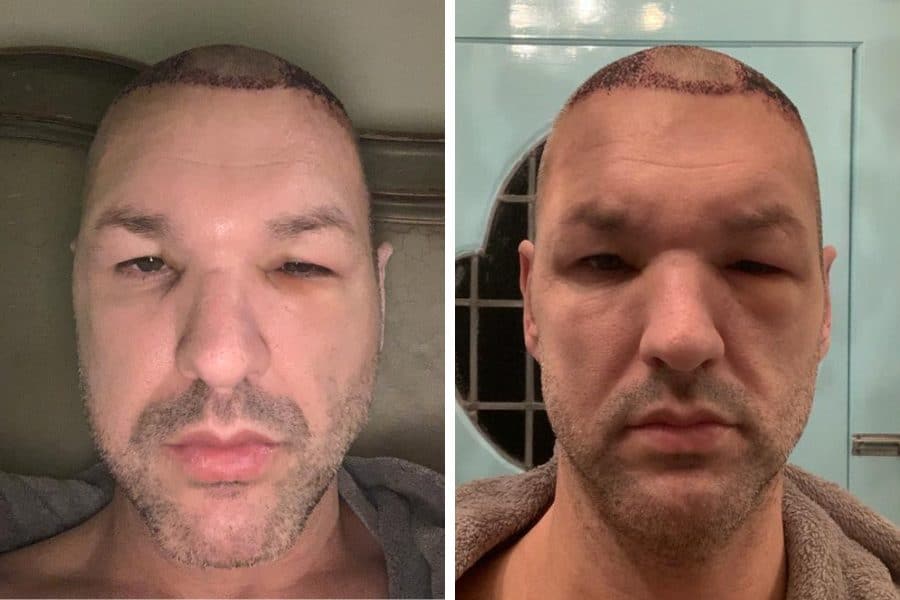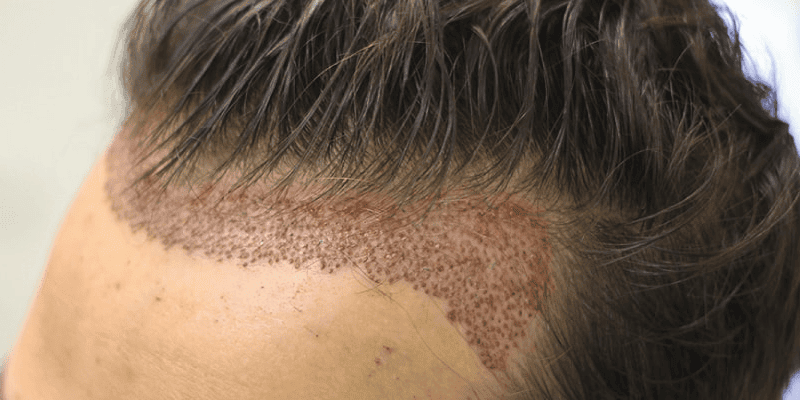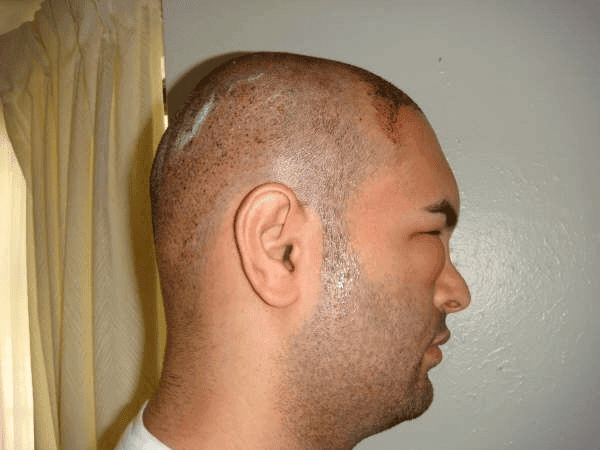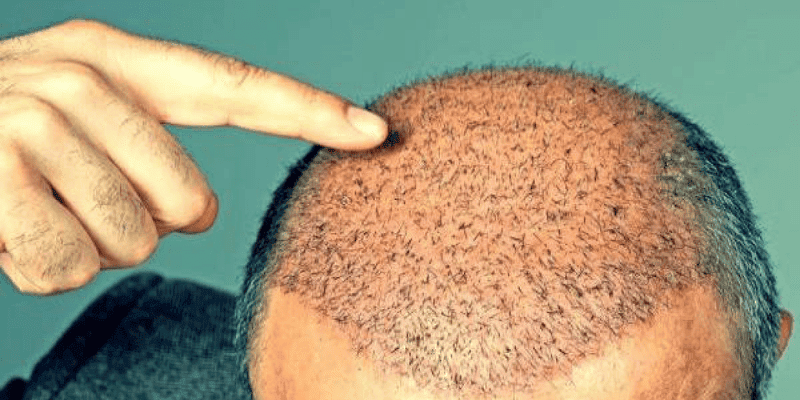So, you’ve just undergone a procedure on your scalp and now you’re wondering if it’s normal to experience swelling. Well, let me tell you, it’s actually quite common. Many people find themselves dealing with some degree of swelling after a scalp procedure, whether it’s a hair transplant or something else. But don’t worry, the swelling is usually temporary and should subside on its own. In this article, we will explore why swelling occurs, when you should be concerned, and how to manage it effectively. Yes, it is normal to experience swelling in the scalp after a procedure. Swelling in the scalp can occur due to various reasons, including inflammation and fluid retention. In this article, we will explore the causes, symptoms, management strategies, and potential complications related to scalp swelling. We will also discuss when to seek medical attention and how to prevent swelling in the scalp.
Causes of Swelling in the Scalp
Inflammation
One of the main causes of swelling in the scalp is inflammation. Inflammation is a natural response of the body to injury or trauma. After a procedure on the scalp, such as surgery or hair transplantation, inflammation can occur as a result of tissue damage. This leads to an accumulation of fluid in the affected area, causing swelling.
Fluid Retention
Another common cause of swelling in the scalp is fluid retention. Fluid retention can occur due to various factors, such as changes in blood flow and the body’s response to trauma. After a scalp procedure, the body may retain excess fluid in the area, leading to swelling.
Symptoms of Swelling in the Scalp
Pain and Discomfort
Swelling in the scalp can be accompanied by pain and discomfort. The increased pressure from the swelling can cause sensations of tightness or soreness. The intensity of the pain can vary depending on the extent of the swelling and the individual’s pain tolerance.
Redness and Warmth
In addition to pain, swelling in the scalp may also be accompanied by redness and warmth. The increased blood flow to the affected area can cause the skin to appear red and feel warm to the touch.
Visible Swelling
One of the most obvious symptoms of swelling in the scalp is the visible swelling itself. The affected area may appear puffy or enlarged compared to the surrounding healthy tissue. Depending on the severity of the swelling, it may be more noticeable and affect the individual’s appearance.
Tightness or Tension
Individuals experiencing scalp swelling may also feel a sense of tightness or tension in the affected area. The swelling can restrict movement and cause discomfort, making it difficult to perform daily activities without discomfort.

Post-Procedural Swelling
Common After Certain Procedures
Swelling in the scalp is a common occurrence after certain procedures, such as scalp surgery or hair transplantation. These procedures often involve trauma to the tissues, leading to inflammation and fluid retention. It is important to note that the extent and duration of swelling can vary depending on the individual and the specific procedure performed.
Temporary Condition
Post-procedural scalp swelling is usually a temporary condition. It typically resolves on its own within a few days to weeks as the body’s natural healing process takes place. However, it is important to monitor the swelling and follow proper care and management strategies to ensure a smooth recovery.
Factors Affecting Swelling
Type of Procedure
The type of procedure performed on the scalp can influence the extent and duration of swelling. More invasive procedures, such as scalp surgery, may result in greater swelling compared to less invasive procedures. Additionally, the length of the procedure and the techniques used can also play a role in the development of swelling.
Individual Sensitivity
Each individual’s body may react differently to a procedure, including the development of swelling. Some individuals may be more prone to experiencing swelling due to their inherent sensitivity. Factors such as genetics, overall health, and immune response can influence an individual’s susceptibility to swelling.
Pre-existing Conditions
Pre-existing conditions, such as chronic inflammation or autoimmune disorders, can also affect the development and severity of swelling in the scalp. Individuals with underlying health conditions may be more likely to experience prolonged or more severe swelling after a procedure.

Managing Swelling in the Scalp
Applying Cold Compress
One of the effective ways to manage swelling in the scalp is by applying a cold compress. The cold temperature helps constrict blood vessels and reduce inflammation, thereby reducing swelling. Applying a cold compress for 15-20 minutes at a time, several times a day, can provide relief and promote healing.
Taking Over-the-counter Pain Relievers
Over-the-counter pain relievers, such as ibuprofen or acetaminophen, can help alleviate pain and reduce inflammation associated with swelling in the scalp. It is important to follow the recommended dosage and consult with a healthcare professional before taking any medication.
Avoiding Excessive Heat
Excessive heat can exacerbate swelling in the scalp. It is advised to avoid hot showers, saunas, or exposure to direct sunlight during the initial stages of swelling. Heat can increase blood flow to the affected area and worsen inflammation.
Elevating the Head
Elevating the head while resting or sleeping can help reduce swelling in the scalp. Keeping the head elevated at a 30 to 45-degree angle can promote proper circulation, reduce fluid accumulation, and aid in the overall reduction of swelling.
Following Doctor’s Instructions
It is crucial to follow the doctor’s instructions and recommendations for managing swelling in the scalp. They may provide specific guidelines regarding wound care, medication usage, and activities to avoid. Adhering to these instructions will help ensure proper healing and minimize the risk of complications.
When to Seek Medical Attention
Severe or Prolonged Swelling
While swelling in the scalp is generally considered normal after a procedure, severe or prolonged swelling may require medical attention. If the swelling worsens or persists beyond the expected recovery period, it is important to consult with a healthcare professional to rule out any underlying complications or infections.
Signs of Infection
If there are signs of infection, such as increased pain, discharge, foul odor, or fever, medical attention should be sought immediately. Infection can hinder the healing process and may require treatment with antibiotics or additional medical interventions.
Concerns about Healing
If there are concerns about the healing process or any unexpected symptoms accompanying the swelling, it is advisable to reach out to the healthcare provider. They can assess the situation and provide guidance on appropriate next steps.

Preventing Swelling in the Scalp
Discussing Potential Swelling with the Surgeon
Before undergoing a scalp procedure, it is important to discuss the potential for swelling with the surgeon. They can provide information about the likelihood and severity of swelling based on the specific procedure being performed.
Following Pre-operative Instructions
To minimize the risk of swelling, it is crucial to follow the pre-operative instructions provided by the surgeon or healthcare team. This may include avoiding certain medications or substances, such as blood thinners or alcohol, that can increase the likelihood of swelling.
Avoiding Certain Medications or Substances
Certain medications and substances can contribute to swelling in the scalp. It is important to inform the healthcare provider about any medications or substances being taken prior to the procedure. They can provide guidance on whether certain medications should be temporarily discontinued to reduce the risk of swelling.
Using Proper Post-operative Care
Proper post-operative care can greatly help in preventing or minimizing swelling in the scalp. This includes following the recommended wound care protocol, avoiding activities that can disrupt healing or increase blood flow to the scalp, and maintaining good overall health through proper nutrition and hydration.
Other Complications Related to Scalp Procedures
Infection
In addition to swelling, scalp procedures can carry the risk of infection. Proper wound care and following medical instructions can help minimize the risk of infection. However, if signs of infection develop, such as redness, swelling, pain, or pus, medical attention should be sought immediately.
Bleeding
Bleeding can occur after a scalp procedure, leading to hematoma or the collection of blood under the skin. Applying gentle pressure and contacting the healthcare provider can help address excessive bleeding and prevent further complications.
Numbness or Tingling
Some individuals may experience temporary numbness or tingling sensations in the scalp after a procedure. This is usually due to nerve irritation or damage during the procedure. In most cases, the sensations resolve on their own over time. However, if the symptoms persist or worsen, medical attention should be sought.
Scarring
Scalp procedures, particularly surgeries, can result in scarring. The extent and visibility of the scars can vary depending on the procedure and individual healing responses. Proper wound care during the healing process can help minimize the appearance of scars.

Recovery Time for Scalp Swelling
Varies by Individual and Procedure
The recovery time for scalp swelling can vary greatly depending on the individual and the specific procedure performed. Some individuals may experience rapid resolution of swelling within a few days, while others may require several weeks for complete resolution. It is important to follow the recommended care instructions and give the body adequate time to heal.
Typically Resolves within a Few Days to Weeks
In most cases, swelling in the scalp resolves within a few days to weeks without any complications. Proper management strategies, such as applying cold compresses, taking pain relievers, and following doctor’s instructions, can help expedite the healing process and alleviate symptoms.
Conclusion
Swelling in the scalp after a procedure is generally considered normal. It can be caused by inflammation and fluid retention, which are natural responses to trauma or injury. While mild swelling is expected, severe or prolonged swelling, signs of infection, or concerns about healing should be addressed with a healthcare professional. By following proper care and management strategies, such as applying cold compresses and taking pain relievers, individuals can promote healing and alleviate symptoms. It is important to remember that the recovery time for swelling varies by individual and the specific procedure performed. With proper care and patience, swelling in the scalp can resolve within a few days to weeks, allowing individuals to return to their normal activities.

